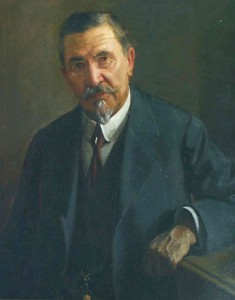 At the beginning of the Great War, on the night between September 29 and 30, 1914, the famous Serbian composer and music pedagogue Stevan Stojanović Mokranjac died in Skopje, leaving behind numerous works that marked the musical history of Serbia.
At the beginning of the Great War, on the night between September 29 and 30, 1914, the famous Serbian composer and music pedagogue Stevan Stojanović Mokranjac died in Skopje, leaving behind numerous works that marked the musical history of Serbia.
Mokranjac was a composer, collector of Serbian, Macedonian, Bulgarian, and folk songs of other nations. He himself was an excellent singer, choirmaster of several singing societies, but also the founder of many Serbian musical institutions. As a performer, he was self-taught on the violin.
While composing melodies, Stevan used to forget to go to school and, although a good student, he had to drop out of the sixth grade of high school. He finished it a year later, and then he became a regular member of the Belgrade Singing Society, as the only high school student. After finishing high school, he enrolled at the Faculty of Philosophy, majoring in natural sciences and mathematics.
In 1879, the Belgrade Singing Society sent Mokranjac to study music in Munich, where he studied with professors Sax and Rheinberger, but did not finish his studies. Upon his return, he worked as a choirmaster of the “Kornelije Stanković” society and then composed “The First Requiem” and “The First Garland”, which the Society performed in the spring of 1884 at the National Theatre, at a charity concert. In the same year, Mokranjac composed the Second Garland for mixed choir and a soloist.
After the performance of the mixed choir “Kornelije” in the Cathedral Church, Mokranjac received an offer to continue his musical studies in Rome. From Rome, with the approval of the Minister of Education, he went to Leipzig, where he studied composition with professors Jadassohn and Reinecke. After returning to Belgrade, he became a music teacher at the First Belgrade Gymnasium and choirmaster of the Belgrade Singing Society, a position he would hold until his death in 1914.
In 1892, Stevan Stojanović met Marija Mica Predić, his future wife. The “Fifth Garland”, dedicated to her, was first performed in front of the king, and then in Dubrovnik and on Cetinje.
After the trip to Dubrovnik, the Belgrade Singing Society performed in Thessaloniki, Skopje, Buda, Pest, Sofia, Constantinople, Germany and Russia. Mokranjac receives excellent reviews not only from music lovers, but also from the greatest dignitaries – princes, emperors, kings, sultans.
Mokranjac became a singing teacher at the St. Sava Seminary in 1901. In this position, in addition to conducting the Belgrade Singing Society, Mokranjac remained until his death.
Although in poor health and crushed by the despair of having to retreat to Skopje, because the First World War had already begun, Mokranjac worked until his last breath. He wrote his last poem “Winter Day”, based on the text of Jovan Jovanović Zmaj, three days before his death.
Chroniclers record that on the train to Skopje, Mokranjac’s eyes lit up every time he heard a gypsy band playing. While he was staying in the Macedonian capital, when asked by his friends how he was doing, he would reply, “Here, I’m working on the Sixteenth Garland.”
Every September, the Days of Mokranjac are held in Negotin, which gather a large number of participants and fans of his music: musicologists, choirs from the country and Europe, his devotees. And just as Mokranjac used to choose the compositions or composers of the country in which he was performing for the guest performances of the Beograd Singing Society, so today, when they want to repay our audience, famous world choirs perform one of Mokranjac’s famous Garlands or some other piece from his secular or spiritual musical opus.
